中考英语易混词汇总结
- 格式:doc
- 大小:32.50 KB
- 文档页数:7
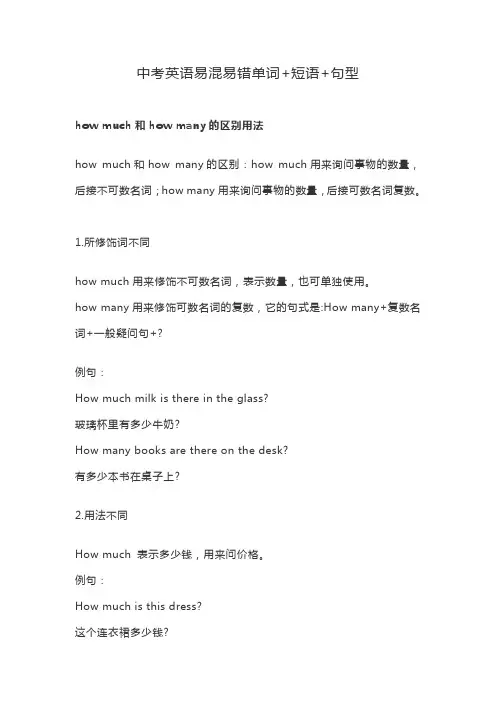
中考英语易混易错单词+短语+句型how much和how many的区别用法how much和how many的区别:how much用来询问事物的数量,后接不可数名词;how many用来询问事物的数量,后接可数名词复数。
1.所修饰词不同how much用来修饰不可数名词,表示数量,也可单独使用。
how many用来修饰可数名词的复数,它的句式是:How many+复数名词+一般疑问句+?例句:How much milk is there in the glass?玻璃杯里有多少牛奶?How many books are there on the desk?有多少本书在桌子上?2.用法不同How much 表示多少钱,用来问价格。
例句:How much is this dress?这个连衣裙多少钱?How many 表示多少,用来问数量。
例句:How many apples do you have?你有多少苹果?in和on的区别用法当我们表示某些东西被其他东西所包围时使用“in”这个词。
而“on”用于描述物体被放置在其他物体上方或外部的情况。
in可表时间,表地点,表手段、方法、材料。
on表示时间、地点、方位等。
1.意思不同in:prep.在... 里;在... 地方;在... 期间on:prep.在... 之上2.用法不同in:in着重一段时间的过程,常用于重复动作或延续动作。
in表示从现在时间算起推移到将来的一段时间之后,一般与将来时态连用。
例句:He is a layman in economics.他对经济学一窍不通。
on:表示“在物体的表面上”,只能用on的表达方式有on the next morning,on the following。
例句:The spider is walking on the ceiling.蜘蛛在天花板上爬行。
3.侧重点不同in:表示“在其中”。
on:表示“在表面”。
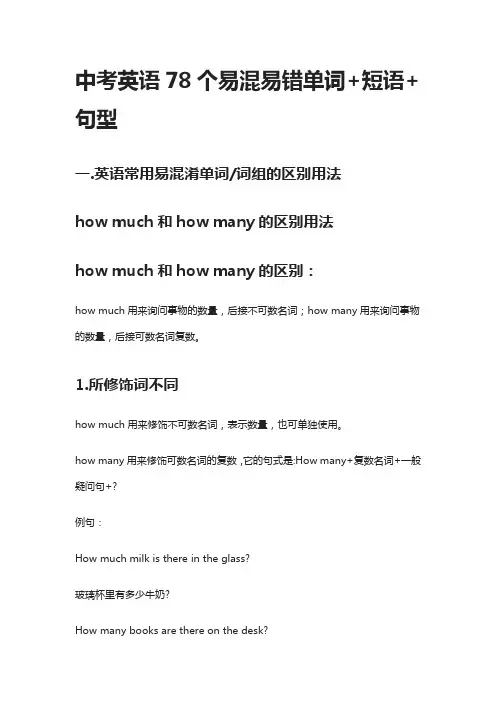
中考英语78个易混易错单词+短语+句型一.英语常用易混淆单词/词组的区别用法how much和how many的区别用法how much和how many的区别:how much用来询问事物的数量,后接不可数名词;how many用来询问事物的数量,后接可数名词复数。
1.所修饰词不同how much用来修饰不可数名词,表示数量,也可单独使用。
how many用来修饰可数名词的复数,它的句式是:How many+复数名词+一般疑问句+?例句:How much milk is there in the glass?玻璃杯里有多少牛奶?How many books are there on the desk?有多少本书在桌子上?2.用法不同How much 表示多少钱,用来问价格。
例句:How much is this dress?这个连衣裙多少钱?How many 表示多少,用来问数量。
例句:How many apples do you have?你有多少苹果?in和on的区别用法:当我们表示某些东西被其他东西所包围时使用“in”这个词。
而“on”用于描述物体被放置在其他物体上方或外部的情况。
in可表时间,表地点,表手段、方法、材料。
on表示时间、地点、方位等。
1.意思不同in:prep.在 ... 里;在 ... 地方;在 ... 期间on:prep.在 ... 之上2.用法不同in:in着重一段时间的过程,常用于重复动作或延续动作。
in表示从现在时间算起推移到将来的一段时间之后,一般与将来时态连用。
He is a layman in economics.他对经济学一窍不通。
on:表示“在物体的表面上”,只能用on的表达方式有on the next morning,on the following。
The spider is walking on the ceiling.蜘蛛在天花板上爬行。
3.侧重点不同in:表示“在其中”。
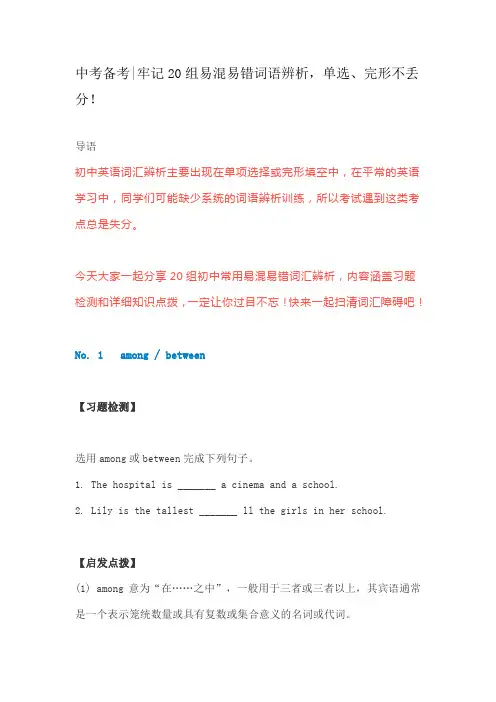
中考备考|牢记20组易混易错词语辨析,单选、完形不丢分!导语初中英语词汇辨析主要出现在单项选择或完形填空中,在平常的英语学习中,同学们可能缺少系统的词语辨析训练,所以考试遇到这类考点总是失分。
今天大家一起分享20组初中常用易混易错词汇辨析,内容涵盖习题检测和详细知识点拨,一定让你过目不忘!快来一起扫清词汇障碍吧!No. 1 among / between【习题检测】选用among或between完成下列句子。
1. The hospital is _______ a cinema and a school.2. Lily is the tallest _______ ll the girls in her school.【启发点拨】(1) among意为“在……之中”,一般用于三者或三者以上,其宾语通常是一个表示笼统数量或具有复数或集合意义的名词或代词。
(2) between一般指两者之间,其宾语通常是表示两者概念的名词或代词,或由and连接的两个具体的人或物。
between有时也可表示多者之中的“两两之间”。
如:Switzerland lies between France, Germany, Austria and Italy.Key:1. between2. amongNo. 2 lay / lie【习题检测】用lay或lie的适当形式完成句子。
1. I _______ the table when my mother cooked the meal.2. John was ill and _______ in bed all morning.【启发点拨】(1) lay作动词,可意为“摆放(餐桌)”,其过去式与过去分词均为laid,现在分词为laying,常用于短语lay the table,意为“摆放餐桌”。
如:Tom was laying the table.(2) lie作动词,意为“躺;平躺”时,过去式为lay,过去分词为lain,现在分词为lying。
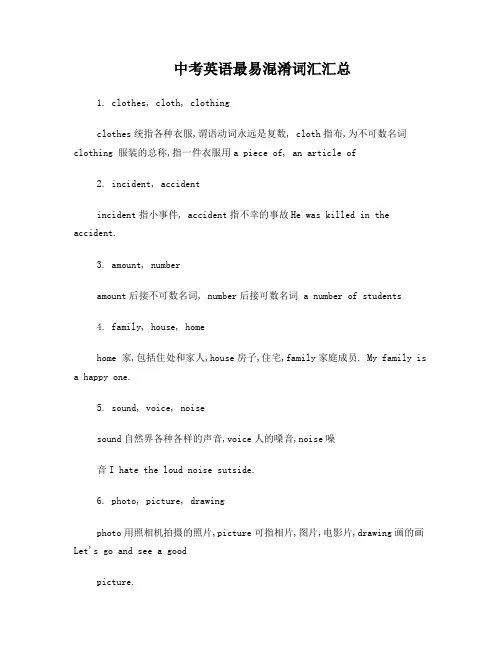
中考英语最易混淆词汇汇总1. clothes, cloth, clothingclothes统指各种衣服,谓语动词永远是复数, cloth指布,为不可数名词clothing 服装的总称,指一件衣服用a piece of, an article of2. incident, accidentincident指小事件, accident指不幸的事故He was killed in the accident.3. amount, numberamount后接不可数名词, number后接可数名词 a number of students4. family, house, homehome 家,包括住处和家人,house房子,住宅,family家庭成员. My family is a happy one.5. sound, voice, noisesound自然界各种各样的声音,voice人的嗓音,noise噪音I hate the loud noise sutside.6. photo, picture, drawingphoto用照相机拍摄的照片,picture可指相片,图片,电影片,drawing画的画Let's go and see a goodpicture.7. vocabulary, wordvocabulary词汇,一个人拥有的单词量,word具体的单词He has a large vocabulary.8. population, peoplepopulation人口,人数,people具体的人 China has a large population.9. weather, climateweather一天内具体的天气状况,climate长期的气候状况The climate here is not good for you.10. road, street, path, wayroad具体的公路,马路,street街道,path小路,小径, way道路,途径take this road; in the street, show me the way to the museum.11. course, subjectcourse课程(可包括多门科目),subject科目(具体的学科)a summer course12. custom, habitcustom传统风俗,习俗,也可指生活习惯,后接to do, habit生活习惯,习惯成自然,后接of doing. I've got the habit ofdrinking a lot.13. cause, reasoncause 指造成某一事实或现象的直接原因,后接ofsth./doing sth,reason用来解释某种现象或结果的理由,后接for sth./doing sth. the reason for being late14. exercise, exercises, practiceexercise运动,锻炼(不可数),exercises练习(可数), practice(反复做的)练习 Practice makesperfect.15. class, lesson作"课"解时,两者可以替换.指课文用lesson. 指班级或全体学生用class. lesson 6; class 516. speech, talk, lecturespeech指在公共场所所做的经过准备的较正式的演说,talk日常生活中的一般的谈话,讲话,lecture学术性的演讲, 讲课 a series of lecture on…17. officer, officialofficer部队的军官,official政府官员 an armyofficer18. work, job二者均指工作。
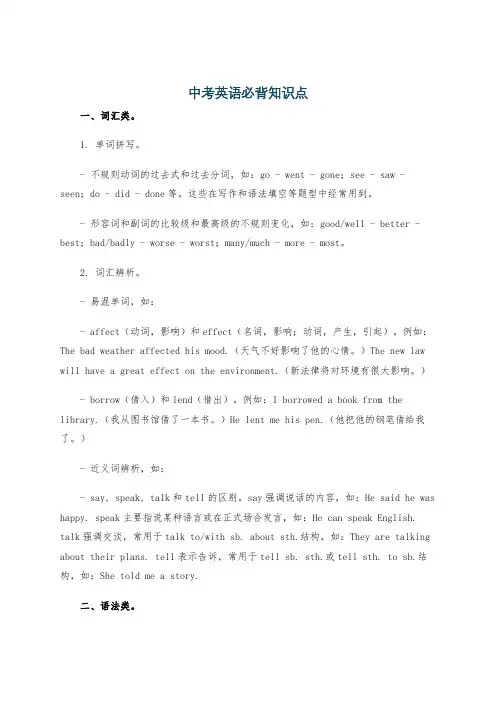
中考英语必背知识点一、词汇类。
1. 单词拼写。
- 不规则动词的过去式和过去分词,如:go - went - gone;see - saw - seen;do - did - done等。
这些在写作和语法填空等题型中经常用到。
- 形容词和副词的比较级和最高级的不规则变化,如:good/well - better - best;bad/badly - worse - worst;many/much - more - most。
2. 词汇辨析。
- 易混单词,如:- affect(动词,影响)和effect(名词,影响;动词,产生,引起)。
例如:The bad weather affected his mood.(天气不好影响了他的心情。
)The new law will have a great effect on the environment.(新法律将对环境有很大影响。
)- borrow(借入)和lend(借出)。
例如:I borrowed a book from the library.(我从图书馆借了一本书。
)He lent me his pen.(他把他的钢笔借给我了。
)- 近义词辨析,如:- say, speak, talk和tell的区别。
say强调说话的内容,如:He said he was happy. speak主要指说某种语言或在正式场合发言,如:He can speak English. talk强调交谈,常用于talk to/with sb. about sth.结构,如:They are talking about their plans. tell表示告诉,常用于tell sb. sth.或tell sth. to sb.结构,如:She told me a story.二、语法类。
1. 时态。
- 一般现在时。
- 表示经常或习惯性的动作或状态,常与often, usually, always, sometimes 等频率副词连用。

中考英语语法易错易混知识点一、可数名词与不可数名词1.可数名词表示能够用数目表示的名词,常常可以用单数或复数形式来表示,其前可以加"a"或"an"。
例句:I have a book.(单数)/ I have two books.(复数)2.不可数名词表示不能用数目清楚地表示的名词,只能用单数形式,前面不能加"a"或"an"。
例句:I have some milk.(不可数名词)二、形容词与副词1.形容词修饰名词,用来描述或限定名词。
形容词通常放在名词的前面。
例句:She is a beautiful girl.2.副词用来修饰动词、形容词或其他副词,通常放在被修饰词的后面。
例句:He runs fast.三、一般现在时与现在进行时1.一般现在时表示经常性或习惯性的动作,叙述真理或客观事实。
例句:The sun rises in the east.(真理)/ He often plays soccer on weekends.(习惯性动作)2.现在进行时表示现在正在进行的动作。
例句:I am watching TV now.(正在进行的动作)四、一般过去时与过去进行时1.一般过去时表示已经结束的过去的动作。
例句:I finished my homework yesterday.(过去的动作已经完成)2.过去进行时表示过去其中一时刻正在进行的动作。
例句:They were playing basketball at 7 o'clock yesterday evening.(过去其中一时刻正在进行的动作)五、定冠词与不定冠词1.定冠词"the"用来特指已经提到过或可唯一确定的名词。
例句:I saw the boy in the park.(特指已经提到的男孩)2.不定冠词"a"或"an"用来表示泛指或不特指的名词。
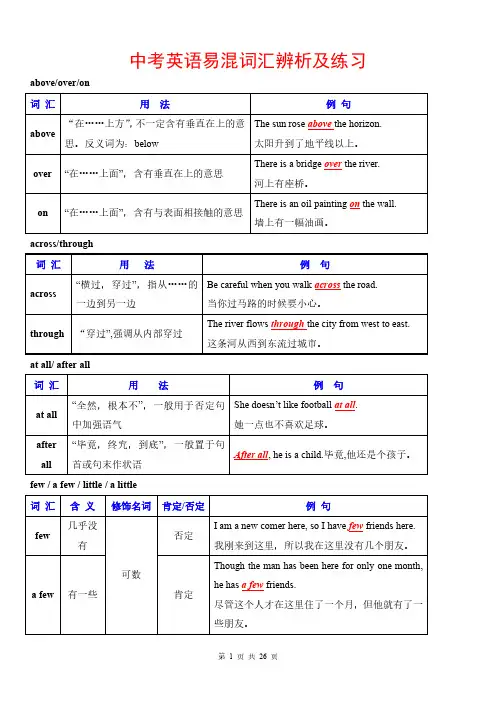
中考英语易混词汇辨析及练习above/over/on词汇用法例句above “在……上方”,不一定含有垂直在上的意思。
反义词为:belowThe sun rose above the horizon.太阳升到了地平线以上。
over“在……上面”,含有垂直在上的意思There is a bridge over the river.河上有座桥。
on“在……上面”,含有与表面相接触的意思There is an oil painting on the wall.墙上有一幅油画。
across/through词汇用法例句across “横过,穿过”,指从……的一边到另一边Be careful when you walk across the road.当你过马路的时候要小心。
through“穿过”,强调从内部穿过The river flows through the city from west to east.这条河从西到东流过城市。
at all/after all词汇用法例句at all “全然,根本不”,一般用于否定句中加强语气She doesn’t like football at all.她一点也不喜欢足球。
after all “毕竟,终究,到底”,一般置于句首或句末作状语After all,he is a child.毕竟,他还是个孩子。
few/a few/little/a little词汇含义修饰名词肯定/否定例句few 几乎没有可数否定I am a new comer here,so I have few friends here.我刚来到这里,所以我在这里没有几个朋友。
a few有一些肯定Though the man has been here for only one month, he has a few friends.尽管这个人才在这里住了一个月,但他就有了一些朋友。
little 几乎没有不可数否定There is little water in the glass,so you can’t drinkany.杯子里几乎没有水了,你不可能喝到水了。
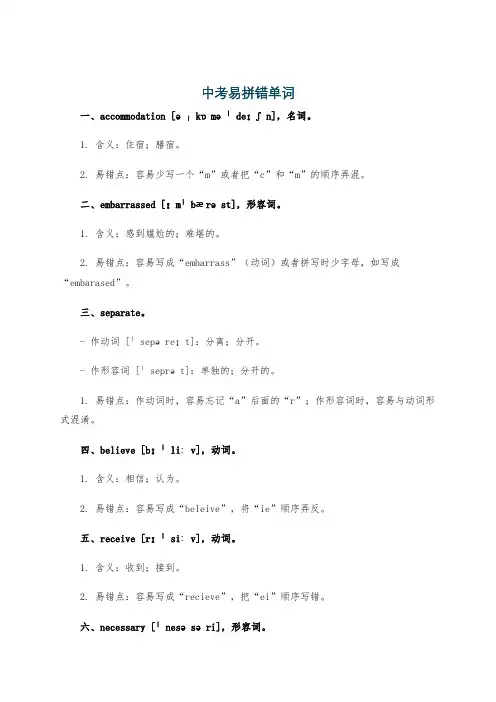
中考易拼错单词
一、accommodation [əˌkɒməˈdeɪʃn],名词。
1. 含义:住宿;膳宿。
2. 易错点:容易少写一个“m”或者把“c”和“m”的顺序弄混。
二、embarrassed [ɪmˈbærəst],形容词。
1. 含义:感到尴尬的;难堪的。
2. 易错点:容易写成“embarrass”(动词)或者拼写时少字母,如写成“embarased”。
三、separate。
- 作动词 [ˈsepəreɪt]:分离;分开。
- 作形容词 [ˈseprət]:单独的;分开的。
1. 易错点:作动词时,容易忘记“a”后面的“r”;作形容词时,容易与动词形式混淆。
四、believe [bɪˈliːv],动词。
1. 含义:相信;认为。
2. 易错点:容易写成“beleive”,将“ie”顺序弄反。
五、receive [rɪˈsiːv],动词。
1. 含义:收到;接到。
2. 易错点:容易写成“recieve”,把“ei”顺序写错。
六、necessary [ˈnesəsəri],形容词。
1. 含义:必要的;必需的。
2. 易错点:容易写成“neccessary”,多写一个“c”。
七、government [ˈɡʌvənmənt],名词。
1. 含义:政府。
2. 易错点:容易写成“goverment”,少写一个“n”。

中考英语常考易混易错重要知识点、语法讲解整理Mr Sun一、介词in/on/at区别1、在泛指在早上、在下午、在晚上、在夜间,用in如:in the morning在早上in the afternoon在下午in the evening在晚上in the night二at night在夜间2、在morning/afternoon/evening/night有定语修饰的时候,要用介词on如:on a cold morning(cold是前置定语)在一个寒冷的早晨On the morning of May1st(of May1"是后置定语)在五月一日的上午3、在某年、某月、某年某月用in,在具体的某一天、在星期儿用。
n,在具体的某一时刻、在中午用at如:in2018在2018年,in January在1月,in February,2018在2018年2月,on the first在1 号,on October1st,2018在2018年10月1号,on/at weekends=on/at the weekend在周末,on Monday在星期一,at six在六点,on weekdays在平日,at noon在中午二、used to do sth.用法1、used to do sth.肯定句式used to do sth.“过去常常做某事/以前经常做某事/曾经”,暗示现在不这样做了。
to为不定式符号,后接动词原形。
如:I used to be a worker,but now I set up a company and become a businessman.It曾经是一名工人,但是现在我成立了公司,成为了一名商人。
(现在不是工人了)The boy used to play soccer after school.这个男孩过去常常放学后踢足球。
(现在不踢了)2、used to do sth.否定句式iin+usedift/used not/didn't use+to do如:He didn't use to study luird=He usedn't to study hard.=He used not to study hard.他过去常常不努力学习。
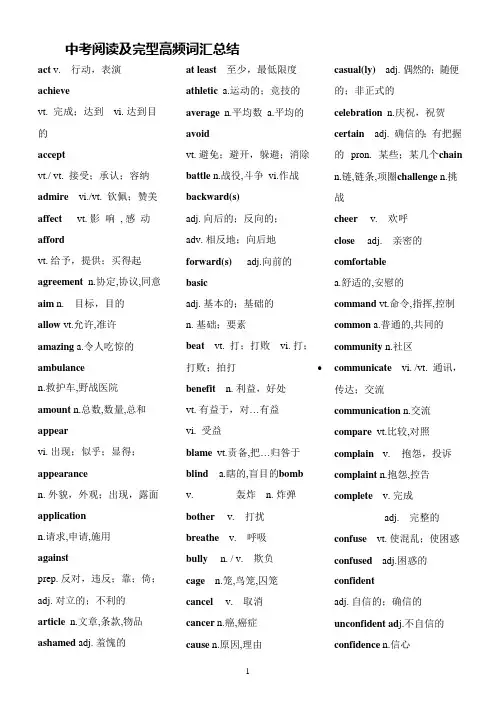
中考阅读及完型高频词汇总结act v. 行动,表演achievevt. 完成;达到vi. 达到目的acceptvt./ vt. 接受;承认;容纳admire vi./vt. 钦佩;赞美affect vt. 影响, 感动affordvt. 给予,提供;买得起agreement n.协定,协议,同意aim n. 目标,目的allow vt.允许,准许amazing a.令人吃惊的ambulancen.救护车,野战医院amount n.总数,数量,总和appearvi. 出现;似乎;显得;appearancen. 外貌,外观;出现,露面applicationn.请求,申请,施用againstprep. 反对,违反;靠;倚;adj. 对立的;不利的article n.文章,条款,物品ashamed adj. 羞愧的at least 至少,最低限度athletic a.运动的;竞技的average n.平均数a.平均的avoidvt. 避免;避开,躲避;消除battle n.战役,斗争vi.作战backward(s)adj. 向后的;反向的;adv. 相反地;向后地forward(s) adj.向前的basicadj. 基本的;基础的n. 基础;要素beat vt. 打;打败vi. 打;打败;拍打benefit n. 利益,好处vt. 有益于,对…有益vi.受益blame vt.责备,把…归咎于blind a.瞎的,盲目的bombv. 轰炸n. 炸弹bother v. 打扰breathe v. 呼吸bully n. / v. 欺负cage n.笼,鸟笼,囚笼cancel v. 取消cancer n.癌,癌症cause n.原因,理由casual(ly) adj. 偶然的;随便的;非正式的celebration n.庆祝,祝贺certain adj. 确信的;有把握的pron. 某些;某几个chainn.链,链条,项圈challenge n.挑战cheer v. 欢呼close adj. 亲密的comfortablea.舒适的,安慰的command vt.命令,指挥,控制common a.普通的,共同的community n.社区•communicate vi. /vt. 通讯,传达;交流communication n.交流compare vt.比较,对照complain v. 抱怨,投诉complaint n.抱怨,控告complete v. 完成adj. 完整的confuse vt. 使混乱;使困惑confused adj.困惑的confidentadj. 自信的;确信的unconfident ad j.不自信的confidence n.信心connect vt.连接,联系contain vt. / vi.包含;容纳;控制; 含有contact n.v. 接触,联系continue vt.继续control vt.控制,克制n.控制consider vt. 认为;考虑;细想;把…当作concentratevi./ vt. 集中;浓缩;全神贯注n. 浓缩液;浓缩,精选countless a.无数的courage n.勇气,胆量course n. 课程curious adj. 好奇的,有求知欲的crash vi.碰撞,坠落n.碰撞crossing n. 十字路口dare vt. aux. v.敢,竟敢damage vi. / vt. 损害;损毁n. 损害;损毁deaf a.聋的degree n.程度,度,学位design vt. vi. /n.设计;计划;构思设计destroyvt. 毁坏;破坏;消灭deserve vi./ vt. 应受,应得describe vt.描述,形容;描绘description n.描述desire n. 欲望;要求vt.要求;想要; 渴望develop v 开发;使成长;进步, 发育;进化diet n.饮食,食物direction n.方向,指导directly adv.直接地,立即disabled adj. 残废的,有缺陷的disappoint v. 使……失望disappearv. 消失;失踪;不复存在disappearancen. 消失;不见discover vt.发现,暴露,显示discuss vt.讨论disorder n.混乱,骚乱distance n.距离,远处double a.两倍的,双的donate vi./ n. 捐赠;捐献drive vi. 开车;猛击vt.驱赶;推动,educatevt. / vi. 教育;培养;训练effect n.效果,效力emotionally adv. 在情绪上encourage vt.鼓励,支持,助长energy n.活力,精力,能量erase vt. 抹去;擦除exactly adv. 确切地exit n.出口,退场vi.退出expect vt.预料,预期,等待experiencev.经历n.经历;经验experienced adj.经验丰富的experiment n.实验,试验expert n. 专家explain v. 解释,说明,辩解explanation n.解释,说明,辩解exploration n.探索explorer n.探测者express vt. 表达;快递adj.迅速的n. 快车,快递;捷运公司expression n.词句,表达,表情extremely adv.极其,非常escape vt. /vi./ n. 逃避,避免;溜走fake n.假货,膺品a.假的fail vt./ vi. 失败,不及格;衰退;fear n. / vt.害怕;担心;恐惧;敬畏fireworks n.[pl.]爆竹, 烟花follow vt.跟随,结果是formaladj. 正式的;拘谨的;有条理informal adj.不正式的free v.释放freedom n.自由fridgen.电冰箱friendship n.友谊,友好fix vt. 安装;修理;安排定;frighten vt. 使惊吓;吓唬…vi.害怕,惊恐frightened adj.害怕的;受惊的;受恐吓的gathervt. 收集;使…聚集vi. 聚集get-togethern.(使)聚集;(使)集合generous adj. 慷慨的,大方的;宽宏大量的government n.政府graduallyadv.逐渐地,逐步地greetvt. 欢迎,迎接;致敬,致意harm n. /vt. 伤害;损害harmful adj.有害的hand v. 递给handy adj. 手边的,便利的;容易取得的handout n.分发head n. 首领, 头目headphone n. 耳机height n 高度high-fat adj.高脂肪的hidevi. vt. n.隐藏;隐瞒;鞭打highway n.高速公路hit vt. vi.袭击;碰撞;打击;偶然碰上n. 打击;打;(演出等)成功;讽刺hold vt./vi. 持续;保存;拥有;容纳;举行honesty n. 诚实honor v.纪念n. 荣耀;荣誉human-powered adj.人力的improve vi.改善,提高imaginevt./vi. 想像;猜想;include vt.包括,包含increase n. 增加,增长;vi. vt. 繁殖;增加,增大inexpensive a.廉价的infervt. 推断;推论vi.推断;作出推论influence n. 影响;感化;vt. 影响;改变injury n.损害,伤害,受伤处instruction n.命令,教学,教训insist vt./vi. 坚持,强调intellectual n.知识分子 a.智力的international a.国际的interview n.接见,会见,面谈introduce vt. 介绍;引进;提出;采用invite v. = attract 吸引item n. 提干,条款journey n.旅行,旅程judge v. 判断last n. 末尾,最后;上个adj.最后的v.持续;维持vt. 度过,拖过;使维持laptop n. 手提式个人电脑latest a. 最近的leading adj.最主要的,第一的light v. 点燃limit n. 限度;限制;界线vt. 限制;限定location n.位置,场所lower v. 低下make v. 获得;布置,安排;做成majora.主要的,多数的n.专业magic n. 巫术;魔法adj.有魔力的;manage vt.管理,控制manager n.经理marryvt.娶,嫁vi.结婚measurevt.量,测量n.测量;措施meet vt. 遇见;满足vi. 相遇;接触n. 集会adj. 适宜的mental adj. 精神的;脑力的n. 精神病患者mention vt. 提到,谈到;n. 提及,说起middle-aged adj. 中年的nod n. 点头;打盹vt. 点头;点头表示mop v. 拖(地板)murder n.谋杀vt.谋杀nativea.本国的n.本地人naturally ad.自然地;天然地nervous a.紧张的,易激动的nervousnessn.神经过敏; 紧张nutn. 坚果nutritious a.有营养的noticen. 通知,布告;注意;公告vt. 注意到;通知;留心obstacle n.障碍•offer vt. 提供;试图;出价n. 提议;operation n.操作;经营;手术organize v. 组织overdo v.把…做得过度overdone adj. 煮得太久的;做得过分的patient a.耐心的n.病人peacefullyadv. 和平地,和谐地perfectvt.改善a.完美的perform vt.执行;演出phone n.电话vt.打电话photography n.摄影,照相physical(ly) adv. 体格上,身体上picture v. 描绘please vt. 使高兴,使满意;使喜欢vi.令人高兴;讨人喜欢pleased adj. 高兴的;喜欢的pleasing adj. 令人愉快的;讨人喜欢的poison n.毒药vt.毒害;投毒pollute vt.污染powdern.粉末;火药power n.力量powerful a.强有力的practice v.练习,实践prefer v.更喜欢prevent v 预防,阻止president n.总统,校长press vt./ vi.压;按;逼迫n. 按;压pressurev.向…施加压力n.压力.pretend vt. / vi. 假装;伪称adj. 假装的predict vt. 预报,预言;预知vi. 作出预言private a.私人的,秘密的produce vt.生产;产生producer n.生产者production n.产品;产量progress n.进展,进步prompt n. 提示proper adj.适当的protect vt.保护,保卫promisen. / vt. 许诺,允诺prove vt.证明vi.结果是punish v. 惩罚purpose n.目的,意图push vt./vi. 推动;推行;逼迫radio v. 用无线电发射rainforest n. 雨林raisevt. 提高;筹集;养育;升起vi.上升n. 上升;高地;加薪rate n.比率;速度;价格vt.评价,估价(un)reasonable adj. 合理的;通情达理的reach vi. / vt. 达到;延伸;传开;伸出手receive vt. 收到;接待;接纳vi. 接收reaction n. 反应,感应;反作用reference n. 证明人reduce vt. / vi. 减少;降低refuse v. 拒绝reuse n. 重新使用,再用vt. 再使用regular(ly) a.规则的,常规的relativelyadv.比较…地,相对地relaxation n.松驰;松懈relaxed a.放松的reviewn. 评论;回顾;复习v.回顾;复审;检查; 写评论; remove vt.移动;搬迁recognize vt. 承认;认出,识别vi.承认remain vi.保持;依然;留下n. 遗迹rescue vt. n. 援救;营救;解救requirement n.需要,要求respect n./ vt. 尊敬,尊重;方面;敬意respond v. 回应,反应result n.成果;结果vi.结果,导致reward n.报答;报酬vt.报答;酬金renew vt. 使更新;续借vi.更新;重新开始remove vt. / vi. n.移动;开除;调动; 搬家rush v. 冲, 奔, 闯run vi. /vt. /n. vi. 奔跑;运转;经营;(水) 流ruin n. 毁坏;灭亡;废墟vt. 毁灭vi. 被毁灭;堕落risevi. 上升;增强;起立;高耸n. 上升;高地;增加;出现raisevt. 提高;筹集;养育;升起vi. 上升n. 上升;高地;safety n.安全,保险satellite n.卫星satisfy vt.满足,使满意(un)satisfied adj. 感到满意的scare v. 恐吓,使……害怕= fear, frightenscientific a.科学的screen n. 触屏seed n.种(子),籽search vi. / vi./ n. 搜寻;调查;探求select vt. 挑选;选拔adj.精选的;极好的n. 被挑选者;精萃seldom adv. 很少,不常self-centered a. 自我中心的利己主义的separate V.分离,分开separation n.分离,分开serve vt./vi. 招待,供应;为…服务shake vt. 摇动;发抖; 震动n. 摇动;哆嗦shape n.形状vt.形成share vt.分享,共享n.份额,股份sickness n.疾病;恶心,呕吐感signal n. 信号similar a.相似的,类似的skim v 略读;从…表面飞掠过special a.特殊的,专门的start-up n. 启动,(刚刚起步的)小公司stay vi. /vt. n. 停留;暂住;停下;坚持strategy n. 策略stressful a.有压力的structure n.结构;建筑物vt. 建造suffer v. 遭受…..痛苦suggest vt.建议;暗示,启发support vt. 支持,支援n. 支持者supplyn. 供给,补给;供应品vi./ vt. 供给,提供;补充solve vt. 解决;解答vi. 作解答solution n. 解决system n.系统;制度spreadvt. 传播,散布;伸展;铺开n. 传播;伸展adj. 伸展的talent n.天才,才能technology n.工艺,技术teenager n.青少年telegram n.电报temperature n.温度;体温tent n.帐篷theory n.理论,学说thumb n.大拇指traditional a.传统的treatvt.对待,处理n.款待trust n./ vt. 信任,信赖underground a.地下的;秘密的underlined adj. 划线於下的unexpected a.意外的universal a.宇宙的;普遍的unlit adj. 未点燃的unusuala.不平常的,独特的value n.价值,价格vt.评价vehicle n.车辆victory n.胜利,战胜volunteer n. 志愿者adj.志愿的vi. 自愿worth adj. 值…的n. 价值;财产wonder n. 惊奇;奇迹v惊讶;想知道高频词组a bit (of) 有一点,一会儿a few 一些,少量a great deal 大量,许多a good/great many 大量a kind of 一种,一类a little 一点,少许a lot of 许多,大量a number of 一些,许多a pair of 一双,一副a piece of 一块,一张,一根,一片above all 首先,首要according to 根据,按照add up to 合计达……after all 毕竟,终究after class 课后again and again 反复地,再三地agree to do sth. 同意做某事agree with sb. 同意某人的看法ahead of 在……之前all in all 总的来说,总计all kinds of 各种各样的allover 到处,遍及,结束all right 行了,好吧,(病)好了all the best 一切顺利,万事如意answer for 对……负责apart from 除去,除了arrive at (in) a place到达某地as a matter of fact 事实上,其实as a result (作为)结果as...as 像,如同as soon as 一……就……as far as (表示程度,范围)就……;尽……as if 好像,仿佛as long as 只要as though 好像,仿佛as usual 通常,平常地as well 也,还有as well as 除……之外(也)belong to 属于be proud of 骄傲,自豪be strict with对……严格要求both...and两个都,既……又…… break away from 脱离…… break down 损坏; (把化合物等) 分解,(汽车)抛锚break in 闯入,强行进入,插嘴,打断break off 打断; 折断break out (战争、火灾等)突然发生,爆发break up 分解;分裂bring in 引来,引进,吸收bring on 引起,导致,使前进bring up 教育,培养build up 逐步建立by accident 偶然by air ( bus, train, ship ) 乘飞机(公共汽车,火车,轮船)by and by 不久以后,逐渐地by day 日间,在白天by the way 顺便说call for 提倡,号召, 需要call in 召来,召集call on 拜访,访问call up 号召,打电话care for 喜欢;照顾(病人)carry off 携走,夺走carry on继续下去; 继续开展carry out 开展,执行catch up with 赶上(或超过)change into 转换成,把……变成check in 报到,登记check out 查明; 结账clear up 整理,收拾, (天气)放晴come about 发生,产生come across (偶然)遇见(或发现)come back 回来,想起来come down 落,下来come from 出生(于),来自come in 进入,进来come off 从……离开,脱落come on 来吧,赶快come out 出来,(书等)出版,发行come to 共计,达到come true 变为现实,成为事实come up 上来,上升,抬头come up with 追上,赶上;想出(主意);找出(答案)compare to 与……相比compare with 与……相比congratulate...on 祝贺……connect to 连接,相连connect with 与……相连cutdown 砍倒cut off 切断cut up 齐根割掉,切碎dayand night 日日夜夜doone's best 尽最大的努力deal with 处理,对付depend on (upon) 依靠,相信,信赖die out 消失,灭亡different from 与……不同divide up 分配divide...into... 把…分成……do some cleaning (shopping) 做扫除(买东西)dozens of 几十drop in 顺便走访(某人)due to 由于,因为each other 相互earn one's living 谋生either...or 或者…… 或者……enjoy oneself 过得愉快even if 即使,尽管even though 即使,尽管ever since 自那时起直到现在face to face 面对面fall asleep 入睡fallill 患病,病倒faraway 遥远的farfrom 远离feel like doing 想要……, 感觉要……figure out 理解,想明白fill ... with 用……填充fill in 填充find out 查明,发现,了解first of all 首先for ever 永远forexample 例如from now on 从今以后,今后from then on 从那时起from...to 从…… 到…… fromtime to time 不时,偶尔getalong with 与……相处getaway 逃; 离get back 返回; 回来; 回家get close (to) 接近get down 降下get down to 开始认真(做某事)get in 进入, 收获,达到get off 脱下(衣服等);下车get on 上车;过活get on with sb. 与……相处get through通过,拨通(电话)get together 聚会,联欢get up 起床give away 分发give back 归还;送回give in 屈服,让步give out 分发give up 放弃go ahead 走在前面,领先;干吧,干下去go away 走开,离去go by 走过; 经过; 过去go fishing (shopping, skat- ing)(去)钓鱼(买东西,滑冰)go for 主张go for a walk 散步goin for 参加,喜欢gooff 走开go on 继续go on doing... 继续干某事,不停地干某事go on with 继续go out 出去, 熄灭go over 仔细检查,复习go through 浏览; 翻阅,通过grow up 长大成人,成长hadbetter (do) 最好(做)handin 上交; 交纳hand out 分发have a cold 患感冒hang on (打电话时)不挂断,等待片刻hang up 挂断电话have a gift for 对……有天赋have a good time 玩得高兴,过得愉快have classes 上课have fun with 玩得高兴have got to 不得不;必须have to 不得不;必须hear of 听说,知道hear from 收到……的来信help oneself to 请随便吃点help sb. with sth. 帮助某人做某事help...out 帮助某人解决困难hold on 等一等(别挂电话)hold one's breath 不出气,屏住呼吸hold out 伸出;坚持,维持hold up 阻挡,使停顿hundreds of 几百,成百上千hurry up 赶快,快点in a hurry 匆忙,很快地in all 总之in a word 简言之,总之in common 共同,共有in debt 欠债in danger 处在危险状态in fact 事实上,实际上in front of 在……前面in need of 需要,缺少in order 按顺序in order that 为了in order to 为了in other words 换句话说in peace 安静,宁静in public 当众;公开insurprise 吃惊,惊讶inthe end 最后,终于intime 及时,来得及instead of 代替,而不是join in 参加,加入join up 联合起来,联结起来just now 现在,刚才keep back 留下keep doing sth. 继续做某事keep off 勿踏; 勿踩keep on 继续(进行)keep one's word 守信keep up 保持; 维持; 继续knock at 敲knock into sb. 撞上laugh at 嘲笑lead to 导致,导向let in 让……进来,放进let out 放掉, 泄露live on 以…… 为主食,靠……为生look after 照顾look ahead 向前看,展望未来look down upon看不起,轻视look for 寻找look forward to 盼望look into 向……里面看去;调查look out 留神,当心lookthrough 看穿, 浏览lookup 查找lots of 许多,大量make a face 做鬼脸,做苦脸make friends with 与……交朋友make up 和解,化装make up of 由…组成,构成make up one's mind 下决心millions of 成百万上千万,数以百万计more or less 或多或少neither...nor 既不,也不……next to 紧接着,相邻,次于no doubt 无疑地no longer 不再not any more 不再not at all 一点也不,绝非notonly ... but also 不仅…… 而且……not so...as 不像,不如nottill/until 直到……才nowand then 不时,偶尔nowthat 既然of course 当然on (the, an) average 平均,按平均数计算on duty 值日,值班on foot 走路,步行on show 展出,在上演(放映)on time 准时on/over the radio通过收音机once again 再一次once more 再一次once upon a time从前,很久以前one after another一个接一个open up 开启;开创; 开辟or else 否则,要不然ought to 应该out of breath 上气不接下气out of order 运转不正常,出毛病out of work 失业over and over again 反复,多次重复pass by 经过pay attention to 注意pay back 偿还(借款等)pay for 付款pay off 偿清(欠款等) persuade sb. to do 说服pick out 选出pick up 拾起,捡起, 接收;开车去接……point out 指出point to 指向prevent ... from 妨碍, 防止,预防put away 储存put down 记下put off 推迟put on 穿,戴上,上演puton a performance 演出puton weight发福,增加体重put out 扑灭,关熄put up 挂起,举起,贴(广告等)put up with 忍受rather than 而不,非referto 提到,涉及,有关regard... as 把……看作ring back 回电话ring off 挂断电话,停止讲话ring up 打电话给rightaway 立即,马上rightnow 立即,马上runaway 逃跑, 失控runout of 用完save one's life 挽救某人生命scores of 许多,大量see...off 为某人送行sell out 卖完, 出卖send for 派人去叫(请)send out 发出,派遣send up 发出,射出sentence...to death 判处死刑separate...from... 分开set down 放下set free 释放,解放set off 动身,起程;使爆发set out 出发; 开始set up settle down 建立,创立定居,平静下来show off 炫耀side by side 肩并肩,一起so as to 以便,为的是so far 到目前为止so far as (表示程度,范围)就……,尽……so long as 只要so...that 太……以至于……sooner or later 迟早,早晚speed up 加快速度spend...on 在……花钱standfor 代表,象征stick to 坚持stop doing sth. 停止做某事stop to do sth. 停下来做某事struggle against 同……作斗争such as 例如take away 拿走take it easy 别着急,别紧张take off 脱下,起飞take one's time 从容,慢慢行动take out 取出take place 发生take sb. in the arms 搂抱take the place of 取代,代替take up 占去,占据(时间、地位等)talk about 谈论,议论talk of 谈论,议论the day after tomorrow 后天the day before yesterday前天the more...the more... 越……就越……the other day 前几天,某日think about 考虑(是否去做)think of想起,考虑;认为,看法thousands of 成千上万,几千throw away 扔掉too...to 太……以至于不……try on 试穿,试试看try out 试验turn down 关小,调低turn off 关掉(水、电、电视、收音机等)turn on 打开(水、电视、收音机、灯、煤气等)turn over 翻动,犁翻(土地)turn up 到达,来到;开大(声音)up and down 上下,来回used to sth. 习惯于usedto do sth. 过去常常waitfor 等候,等待wake up醒来work out 算出,解决worry about 担心,烦恼wrap up 包好, 伪装write down 写下,记下write to 写信给……11“”“”At the end, Xiao Bian gives you a passage. Minand once said, "people who learn to learn are very happy people.". In every wonderful life, learning is an eternal theme. As a professional clerical and teaching position, I understand the importance of continuous learning, "life is diligent, nothing can be gained", only continuous learning can achieve better self. Only by constantly learning and mastering the latest relevant knowledge, can employees from all walks of life keep up with the pace of enterprise development and innovate to meet the needs of the market. This document is also edited by my studio professionals, there may be errors in the document, if there are errors, please correct, thank you!。
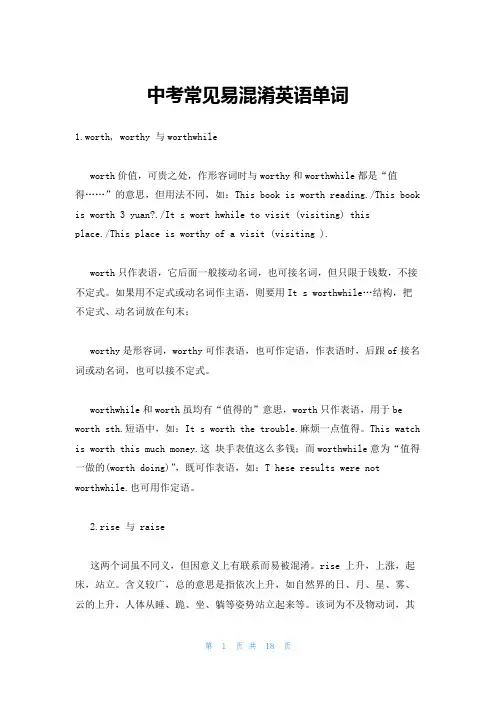
中考常见易混淆英语单词1.worth, worthy 与worthwhileworth价值,可贵之处,作形容词时与worthy和worthwhile都是“值得……”的意思,但用法不同,如:This book is worth reading./This book is worth 3 yuan?./It s wort hwhile to visit (visiting) thisplace./This place is worthy of a visit (visiting ).worth只作表语,它后面一般接动名词,也可接名词,但只限于钱数,不接不定式。
如果用不定式或动名词作主语,则要用It s worthwhile…结构,把不定式、动名词放在句末;worthy是形容词,worthy可作表语,也可作定语,作表语时,后跟of接名词或动名词,也可以接不定式。
worthwhile和worth虽均有“值得的”意思,worth只作表语,用于be worth sth.短语中,如:It s worth the trouble.麻烦一点值得。
This watch is worth this much money.这块手表值这么多钱;而worthwhile意为“值得一做的(worth doing)”,既可作表语,如:T hese results were not worthwhile.也可用作定语。
2.rise 与 raise这两个词虽不同义,但因意义上有联系而易被混淆。
rise 上升,上涨,起床,站立。
含义较广,总的意思是指依次上升,如自然界的日、月、星、雾、云的上升,人体从睡、跪、坐、躺等姿势站立起来等。
该词为不及物动词,其过去式与过去分词分别是rose 和 risen。
例如:The sun rises in the east and sets in the west.日出于东而落于西。
/ Prices rise every day in those countries.那些国家里的物价天天上涨。
一、易错点之易混淆的形近词组1.In front of和in the front of解析:In front of强调在范围外的前面; 而in the front of指在范围内的前面。
例如:The boy sits in the front of the classroom.男孩坐在教室前面。
(这里强调是在教室里面的前排位置)The girl stands in front of the room.女孩站在房间的前方。
(强调在房间外面的前方位置)2.in place of和in the place of解析:in place of代替,等同于insted of; 而in the place of表示在...地方例如:We use gas in place of coal in cooking.我们用煤气代替煤作饭.A new building is being built in the place of the old one.一座新的建筑物正在原来所在建筑物的地方被建。
3.No more than和not more than解析:no more than表示仅仅,只有,相当于only,理解为不多;而not more than表示至多,不超过,小于的意思。
例如:He is no more than an ordinary English teacher. 他只不过是个普通的英文老师。
He has not more than three children. 他最多3 个孩子(有或许还不到三个)4.On earth和on the earth解析:两者都有在地上,在地球上的意思,但on earth还有到底,究竟的意思;On the earth只是单纯的表示在地上,在地球上例如:where on earth did you spring from?你究竟从哪里冒出来的?What if there was no lead on the earth at all?如果地球上根本就没有铅这种物质怎么办?5.At all和after all解析:at all表示根本,全然的意思,常用短语not at all表示一点也不;after all表示到底,毕竟的意思例如:I don't know him at all. 我根本不认识他。
中考英语易混易错单词+ 短语+ 句型how much 和how many 的区别用法how much 和how many 的区别:how much 用来询问事物的数量,后接不可数名词;how many 用来询问事物的数量,后接可数名词复数1. 所修饰词不同how much 用来修饰不可数名词,表示数量,也可单独使用。
how many 用来修饰可数名词的复数,它的句式是:How many+ 复数名词+ 一般疑问句+?例句:How much milk is there in the glass? 玻璃杯里有多少牛奶?How many books are there on the desk?有多少本书在桌子上?2. 用法不同How much 表示多少钱,用来问价格。
例句:How much is this dress?这个连衣裙多少钱?How many 表示多少,用来问数量。
例句:How many apples do you have?你有多少苹果?in 和on 的区别用法当我们表示某些东西被其他东西所包围时使用“ in ”这个词。
而“ on 用于描述物体被放置在其他物体上方或外部的情况。
in 可表时间,表地点,表手段、方法、材料。
on 表示时间、地点、方位等。
1. 意思不同in :prep. 在... 里;在... 地方;在... 期间on :prep. 在... 之上2. 用法不同in :in 着重一段时间的过程,常用于重复动作或延续动作。
in 表示从现在时间算起推移到将来的一段时间之后,一般与将来时态连用。
例句:He is a layman in economics.他对经济学一窍不通on :表示“在物体的表面上”,只能用on 的表达方式有on the next morning ,on the following 。
例句:The spider is walking on the ceiling.蜘蛛在天花板上爬行。
中考易混淆单词词组汇总一、单词部分。
1. accept [əkˈsept] (v.) - 接受。
- 例句:I accept your invitation.(我接受你的邀请。
)2. except [ɪkˈsept] (prep.) - 除……之外。
- 例句:Everyone is here except Tom.(除了汤姆,大家都在这儿。
)3. alive [əˈlaɪv] (adj.) - 活着的,有生气的(作表语或后置定语)- 例句:The fish is still alive.(这条鱼还活着。
)4. living [ˈlɪvɪŋ] (adj.) - 活着的(可作表语和定语),n. 生活,生计。
- 例句:He is one of the greatest living writers.(他是在世的最伟大的作家之一。
)- 例句:make a living(谋生)5. alone [əˈləʊn] (adj. / adv.) - 单独的(地),独自的(地)(强调独自一人的状态)- 例句:He lives alone.(他独自生活。
)6. lonely [ˈləʊnli] (adj.) - 孤独的,寂寞的(带有感情色彩)- 例句:The old man feels lonely.(这位老人感到孤独。
)7. beside [bɪˈsaɪd] (prep.) - 在……旁边。
- 例句:Sit beside me.(坐在我旁边。
)8. besides [bɪˈsaɪdz] (prep. / adv.) - 除……之外(还有),此外。
- 例句:Besides English, we also learn French.(除了英语,我们还学法语。
)- 例句:I don't like this dress. Besides, it's too expensive.(我不喜欢这条裙子。
它太贵了。
初中必考20组必考英语易混词辨析——易混词辨析——1、accomplish vs. achieveaccomplish (v.): 完成某项任务。
例子: She accomplished her homework. (她完成了作业。
)achieve (v.): 实现目标。
例子: He achieved his goal. (他实现了他的目标。
)2、advice vs. adviseadvice (n.): 建议。
例子: I need your advice. (我需要你的建议。
)advise (v.): 提供建议。
例子: I advise you to study. (我建议你学习。
)3、allow vs. permitallow (v.): 允许,通常口语化。
例子: My parents allow me to go out. (我的父母允许我出去。
)permit (v.): 允许,通常正式。
例子: The school permits it. (学校允许这样做。
)4、bored vs. boringbored (adj.): 感到无聊的。
例子: I feel bored in class. (我在课堂上感到无聊。
)boring (adj.): 令人无聊的。
例子: The movie was boring. (这部电影很无聊。
)5、careful vs. cautiouscareful (adj.): 小心的。
例子: Be careful with that glass. (小心那只玻璃杯。
)cautious(adj.): 小心翼翼的,避免风险。
例子: He is cautious with money. (他在处理钱时很小心。
)6、common vs. ordinarycommon (adj.): 普遍的。
例子: It is common to use phones. (使用手机是很常见的。
中考英语易混淆词汇总结一、花费 spend take pay cost1.spend的主语通常是人, 往往用于以下句型:(1) (sb) spend some money/some time on sth。
(2) (sb)spend some money/some time(in)doing sth。
(3)spen.mone.fo.sth.花钱买……例如:.spen.fift.yua.o.th.coat。
..spen.fift.yua.(in.buyin.th.coat.我花50元买了这件大衣。
H.spen.thre.day.o.th.work..H.spen.thre.day.(in.doin.th.work.我干这项工作用了3天。
Hi.mone.wa.spen.fo.books.他的钱用来买书了。
2、take常用于“占用、花费”时间, 后面常跟双宾语, 其主语通常为形式主语“it”或物。
句式是:(1)It takes/took sb.some time to do sth例如: It will take me two days to do the work. 这项工作花了2天时间。
(2)Doin.sth./Sth.take.sb.som.time.例如: The work will take me two days。
这项工作花了2天时间。
3.pay为“付款、赔偿”之意, 主语通常是人, 句型(1)sb.pay.som.mone.fo.sth例如: I paid fifty yuan for the coat。
我花50元买了这件大衣。
(2)pa.(sb..mone.fo.sth.付钱(给某人)买……。
例如:.hav.t.pa.the.2.pound.fo.thi.roo.eac.month.我每个月要付20英磅的房租。
(3)pay money back 还钱。
(4)例如: Ma..borro.1.yua.fro.yo.I'l.pa.i.bac.nex.week.你能借给我12块钱吗?下周还你。
初中英语易混淆知识点篇一:初中易混淆知识点讲解初中易混淆知识点讲解一、spend,cost,take和pay都可以表示“花费”,但用法却不尽相同It takes(took) sb. +金钱或时间 to do sthSb. spend(spent) +金钱或时间 on sthSb. spend(spent) +金钱或时间 (in) doing sthSth cost(cost) + 金钱Sb. pay(paid)+ 金钱 for sthspend的主语必须是人,常用于以下结构:(1) spend time /money on sth. 在??上花费时间(金钱)。
例:I spent two hours on this maths problem. 这道数学题花了我两个小时。
(2) spend time / money (in) doing sth. 花费时间(金钱)做某事。
例:They spent two years (in) building this bridge. 造这座桥花了他们两年时间。
(3)spend money for sth. 花钱买??。
例:His money was spent for books. 他的钱用来买书了。
cost的主语是物或某种活动,还可以表示“值”,常见用法如下:(1)sth. costs (sb.) +金钱, 某物花了(某人)多少钱。
例:A new puter costs a lot of money. 买一台新电脑要花一大笔钱。
(2) (doing) sth. costs (sb.) +时间,某物(做某事)花了(某人)多少时间。
例:Remembering these new words cost him a lot of time. 他花了大量时间才记住了这些单词。
注意:cost的过去式及过去分词都是cost,并且不能用于被动句。
take后面常跟双宾语,常见用法有以下几种:(1) It takes sb. +时间+to do sth. 做某事花了某人多少时间。
中考英语易混词汇总结1. clothes, cloth, clothingclothes统指各种衣服,谓语动词永远是复数,cloth指布,为不可数名词clothing 服装的总称,指一件衣服用a piece of, an article of2. incident, accidentincident指小事件, accident指不幸的事故He was killed in the accident.3. amount, numberamount后接不可数名词,number后接可数名词a number of students4. family, house, homehome 家,包括住处和家人,house房子,住宅,family家庭成员. My family is a happy one.5. sound, voice, noisesound自然界各种各样的声音,voice人的嗓音,noise噪音I hate the loud noise outside.6. photo, picture, drawingphoto用照相机拍摄的照片,picture可指相片,图片,电影片,drawing画的画Let's go and see a good picture.7. vocabulary, wordvocabulary词汇,一个人拥有的单词量,word具体的单词He has a large vocabulary.8. population, peoplepopulation人口,人数,people具体的人China has a large population.9. weather, climateweather一天内具体的天气状况,climate长期的气候状况The climate here is not good for you.10. road, street, path, wayroad具体的公路,马路,street街道,path小路,小径,way道路,途径take this road; in the street, show me the way to the museum.11. course, subjectcourse课程(可包括多门科目),subject科目(具体的学科)a summer course12. custom, habitcustom传统风俗,习俗,也可指生活习惯,后接to do,habit生活习惯,习惯成自然,后接of doing. I've got the habit of drinking a lot.13. cause, reasoncause 指造成某一事实或现象的直接原因,后接of sth./doing sth,reason用来解释某种现象或结果的理由,后接for sth./doing sth. the reason for being late14. exercise, exercises, practiceexercise运动,锻炼(不可数),exercises练习(可数),practice(反复做的)练习Practice makes perfect.15. class, lesson作"课"解时,两者可以替换.指课文用lesson. 指班级或全体学生用class. lesson 6; class 5 16. speech, talk, lecturespeech指在公共场所所做的经过准备的较正式的演说,talk日常生活中的一般的谈话,讲话,lecture学术性的演讲,讲课a series of lecture on…17. officer, officialofficer部队的军官,official政府官员an army officer18. work, job二者均指工作。
work不可数,job可数a good job19. couple, paircouple主要指人或动物,pair多指由两部分组成的东西a pair of trousers20. country, nation, state, landcountry侧重指版图,疆域,nation指人民,国民,民族,state侧重指政府,政体,land 国土,国家The whole nation was sad at the news.21. cook, cookercook厨师,cooker厨具He is a good cook.22. damage, damagesdamage不可数名词, 损害,损失; damages复数形式, 赔偿金$900 damages23. police, policemanpolice警察的总称,后接复数谓语动词,policeman 指某个具体的警察The police are questioning everyone in the house.24. problem, questionproblem常和困难连系,前面的动词常为think about, solve, raise,question常和疑问连系,多和ask, answer连用25. man, a manman人类,a man一个男人Man will conquer nature.26. chick, chicken二者均可指小鸡,chicken还可以当鸡肉The chicken is delicious.27. telegram, telegraph当电报解时,telegram指具体的,telegraph指抽象的a telegram, by telegraph28. trip, journey, travel, voyagetravel是最常用的,trip指短期的旅途,journey指稍长的旅途,voyage指海上航行 a three-day trip29. sport, gamesport多指户外的游戏或娱乐活动,如打球,游泳,打猎,赛马等;game指决定胜负的游戏,通常有一套规则His favorite sport is swimming.30. price, prizeprice价格,prize奖,奖品,奖金win the first prize The price is high/low.31. a number of, the number ofa number of许多,谓语动词用复数。
the number of…的数目,谓语动词用单数。
The number of students is increasing.32. in front of, in the front ofin front of范围外的前面,in the front of范围内的前面In the front of the room sits a boy.33. of the day, of a dayof the day每一天的,当时的,当代的,of a day暂时的,不长久的a famous scientist of the day34. three of us, the three of usthree of us我们(不止三个)中的三个,the three of us我们三个(就三个人)The three of us---Tom, Jack and I went to the cinema.35. by bus, on the busby bus表手段,方式,不用冠词,on the bus表范围They went there by bus.36. for a moment, for the momentfor a moment 片刻,一会儿,for the moment暂时,一时Thinking for a moment, he agreed.37. next year, the next yearnext year将来时间状语,the next year过去将来时间状语He said he would go abroad the next year.38. more than a year, more than one yearmore than a year一年多,more than one year超过一年(两年或三年等)39. take advice, take the(one's) advicetake advice征求意见,take the advice接受忠告He refused to take the advice and failed again.40. take air, take the airtake air传播,走漏,take the air到户外去,散步We take the air every day.41. in a word, in wordsin a word总之,一句话,in words口头上In a word, you are right.42. in place of, in the place ofin place of代替,in the place of在…地方A new building is built in the place of the old one.43. in secret, in the secretin secret秘密地,暗自地,偷偷地,一般用作状语;in the secret知道内情,知道秘密,一般用作表语My mother was in the secret from the beginning.44. a girl, one girla girl可泛指所有女孩, one girl一个女孩Can one girl carry such a big box?45. take a chair, take the chairtake a chair相当于sit down坐下,take the chair开始开会46. go to sea, by sea, by the seago to sea当海员,出航,by sea乘船,由海路,by the sea在海边go by sea47. the doctor and teacher, the doctor and the teacherthe doctor and teacher指一个人,既是医生又是老师,the doctor and the teacher两个人,一个医生和一个老师the doctor and teacher is48. in office, in the officein office在职的,in the office在办公室里He is in office, not out of office.49. in bed, on the bedin bed卧在床上,on the bed在床上The book is on the bed. He is ill in bed.50. in charge of, in the charge ofin charge of管理,负责照料,in the charge of由……照料He is in charge of the matter. The matter is in the charge of her.51. in class, in the classin class在课上,in the class在班级里He is the best student in the class.52. on fire, on the fireon fire着火,on the fire在火上Put the food on the fire. The house is on fire.53. out of question, out of the questionout of question毫无疑问的,out of the question不可能的54. a second, the seconda second又一,再一,the second第…… He won the second prize.55. by day, by the dayby day白天,by the day按天计算The workers are paid by the day.56. the people, a peoplethe people指人,a people指民族The Chinese is a peace-loving people.57. it, oneit同一物体,one同类不同一I lost my pen. I have to buy a new one.58. that, thisthat指代上文所提到的,this导出下文所要说的I was ill. That's why…59. none, nothing, no onenone强调有多少,nothing, no one强调有没有,nothing指物,no one指人--- How many…/How much…? --- None.60. anyone, any oneanyone指人,不能接of,any one指人物均可,可接of any one of you61. who, whatwho指姓名或关系,what指职业或地位What is your dad? He is a teacher.62. what, whichwhat的选择基础是无限制的,which在一定范围内进行选择Which do you prefer, bananas or apples?63. other, anotherother后接名词复数,another后接名词单数other students, another student64. not a little, not a bitnot a little非常,not a bit一点也不I'm not a bit tired. 我一点儿也不累。